2012高考英语必考80个重要句型精讲济南临沂青岛小班文化课一对一辅导机构大智学校2012年高考
- 格式:doc
- 大小:187.50 KB
- 文档页数:33
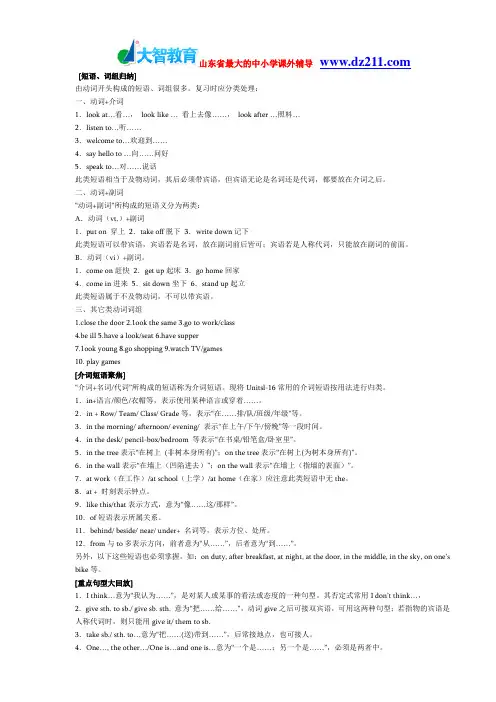
[短语、词组归纳]由动词开头构成的短语、词组很多。
复习时应分类处理:一、动词+介词1.look at…看…,look like … 看上去像……,look after …照料…2.listen to…听……3.welcome to…欢迎到……4.say hello to …向……问好5.speak to…对……说话此类短语相当于及物动词,其后必须带宾语,但宾语无论是名词还是代词,都要放在介词之后。
二、动词+副词“动词+副词”所构成的短语义分为两类:A.动词(vt.)+副词1.put on 穿上2.take off脱下3.write down记下此类短语可以带宾语,宾语若是名词,放在副词前后皆可;宾语若是人称代词,只能放在副词的前面。
B.动词(vi)+副词。
1.come on赶快2.get up起床3.go home回家4.come in进来5.sit down坐下6.stand up起立此类短语属于不及物动词,不可以带宾语。
三、其它类动词词组1.close the door2.1ook the same3.go to work/class4.be ill5.have a look/seat6.have supper7.1ook young 8.go shopping 9.watch TV/games10. play games[介词短语聚焦]“介词+名词/代词”所构成的短语称为介词短语。
现将Unitsl-16常用的介词短语按用法进行归类。
1.in+语言/颜色/衣帽等,表示使用某种语言或穿着……。
2.in + Row/ Team/ Class/ Grade等,表示“在……排/队/班级/年级”等。
3.in the morning/ afternoon/ evening/ 表示“在上午/下午/傍晚”等一段时间。
4.in the desk/ pencil-box/bedroom 等表示“在书桌/铅笔盒/卧室里”。
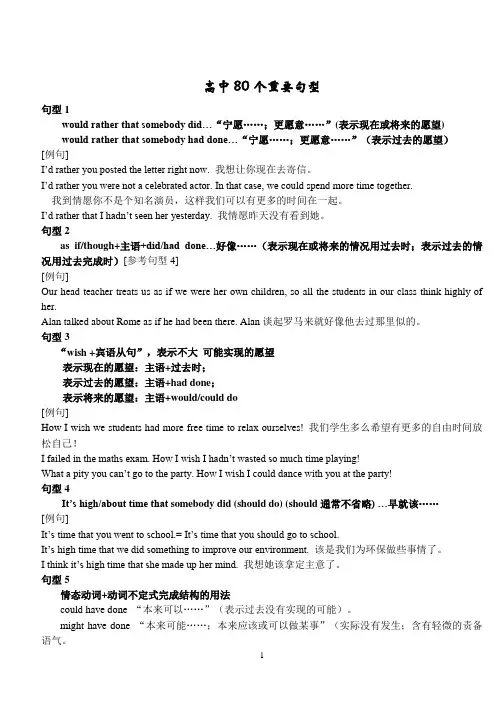
高中80个重要句型句型1would rather that somebody did…“宁愿……;更愿意……”(表示现在或将来的愿望)would rather that somebody had done…“宁愿……;更愿意……”(表示过去的愿望)[例句]I’d rather you posted the letter right now. 我想让你现在去寄信。
I’d rather you were not a celebrated actor. In that case, we could spend more time together.我到情愿你不是个知名演员,这样我们可以有更多的时间在一起。
I’d rather that I hadn’t seen her yesterday. 我情愿昨天没有看到她。
句型2as if/though+主语+did/had done…好像……(表示现在或将来的情况用过去时;表示过去的情况用过去完成时)[参考句型4][例句]Our head teacher treats us as if we were her own children, so all the students in our class think highly of her.Alan talked about Rome as if he had been there. Alan谈起罗马来就好像他去过那里似的。
句型3“wish +宾语从句”,表示不大可能实现的愿望表示现在的愿望:主语+过去时;表示过去的愿望:主语+had done;表示将来的愿望:主语+would/could do[例句]How I wish we students had more free time to relax ourselves! 我们学生多么希望有更多的自由时间放松自己!I failed in the maths exam. How I wish I hadn’t wasted so much time playing!What a pity you can’t go to the party. How I wish I could dance with you at the party!句型4It’s high/about time that somebody did (should do) (should通常不省略) …早就该……[例句]It’s time that you went to school.= It’s time that you should go to school.It’s high time that we did something to improve our environment. 该是我们为环保做些事情了。
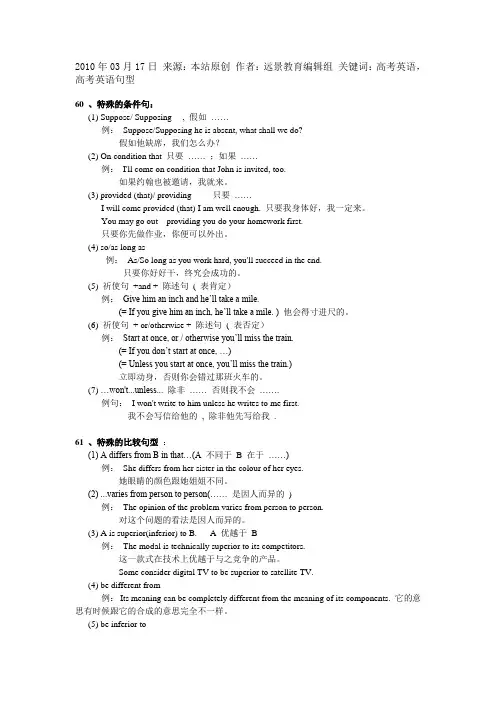
2010年03月17日来源:本站原创作者:远景教育编辑组关键词:高考英语,高考英语句型60、特殊的条件句:(1) Suppose/ Supposing ---, 假如……例:Suppose/Supposing he is absent, what shall we do?假如他缺席,我们怎么办?(2) On condition that只要……;如果……例:I'll come on condition that John is invited, too.如果约翰也被邀请,我就来。
(3) provided (that)/ providing ----- 只要……I will come provided (that) I am well enough. 只要我身体好,我一定来。
You may go out providing you do your homework first.只要你先做作业,你便可以外出。
(4) so/as long as例:As/So long as you work hard, you'll succeed in the end.只要你好好干,终究会成功的。
(5) 祈使句+and + 陈述句(表肯定)例:Give him an inch and he’ll take a mile.(= If you give him an inch, he’ll take a mile. ) 他会得寸进尺的。
(6) 祈使句+ or/otherwise +陈述句(表否定)例:Start at once, or / otherwise you’ll miss the train.(= If you don’t start at once, …)(= Unless you start at once, you’ll miss the train.)立即动身,否则你会错过那班火车的。
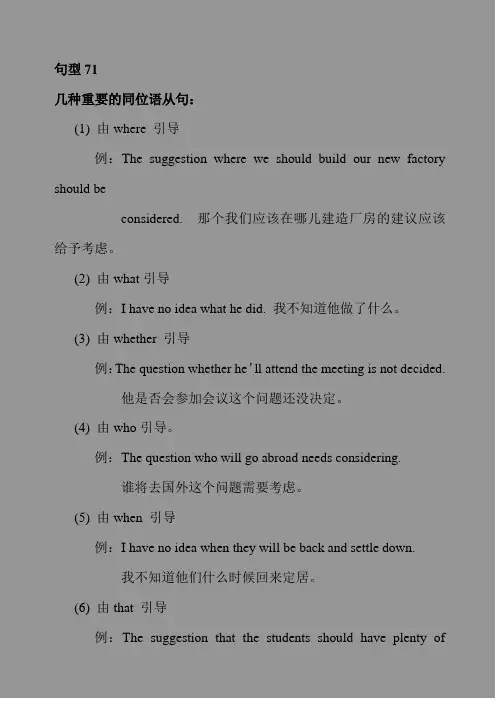
句型71几种重要的同位语从句:(1) 由where 引导例:The suggestion where we should build our new factory should beconsidered. 那个我们应该在哪儿建造厂房的建议应该给予考虑。
(2) 由what引导例:I have no idea what he did. 我不知道他做了什么。
(3) 由whether 引导例:The question whether he’ll attend the meeting is not decided.他是否会参加会议这个问题还没决定。
(4) 由who引导。
例:The question who will go abroad needs considering.谁将去国外这个问题需要考虑。
(5) 由when 引导例:I have no idea when they will be back and settle down.我不知道他们什么时候回来定居。
(6) 由that 引导例:The suggestion that the students should have plenty ofexercise is verygood. 学生应该有很多练习,这个建议不错。
(7) 由how 引导例:He can’t answer the question how he got the money.他是怎样得到那钱的,他不能回答这个问题。
(8) 由why 引导例: We don’t understand the problem why this is the best choice.我搞不懂这个问题,为什么这是最好的选择。
句型72with复合宾语句型(1) with + n + adj.例:He stared at me with his mouth open. 他张着嘴凝视着我。
(2) with + n + adv例:The boy stood there, with his head down. 这男孩低着头站在那。
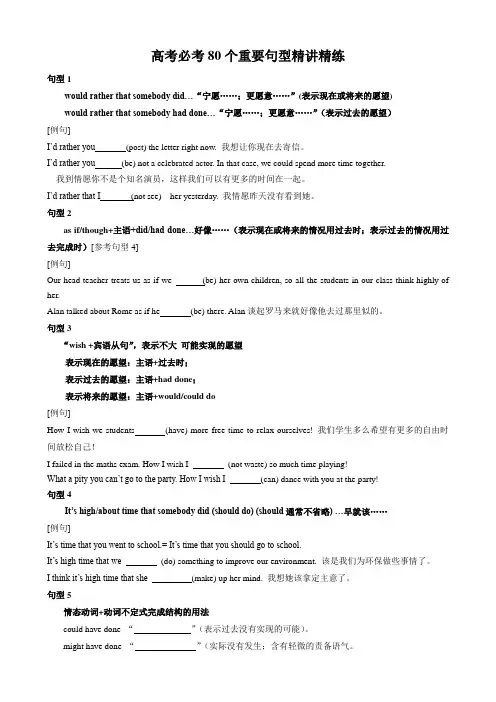
高考必考80个重要句型精讲精练句型1would rather that somebody did…“宁愿……;更愿意……”(表示现在或将来的愿望)would rather that somebody had done…“宁愿……;更愿意……”(表示过去的愿望)[例句]I’d rather you(post) the letter right now. 我想让你现在去寄信。
I’d rather you(be) not a celebrated actor. In that case, we could spend more time together.我到情愿你不是个知名演员,这样我们可以有更多的时间在一起。
I’d rather that I(not see) her yesterday. 我情愿昨天没有看到她。
句型2as if/though+主语+did/had done…好像……(表示现在或将来的情况用过去时;表示过去的情况用过去完成时)[参考句型4][例句]Our head teacher treats us as if we (be) her own children, so all the students in our class think highly of her.Alan talked about Rome as if he (be) there. Alan谈起罗马来就好像他去过那里似的。
句型3“wish +宾语从句”,表示不大可能实现的愿望表示现在的愿望:主语+过去时;表示过去的愿望:主语+had done;表示将来的愿望:主语+would/could do[例句]How I wish we students (have) more free time to relax ourselves! 我们学生多么希望有更多的自由时间放松自己!I failed in the maths exam. How I wish I (not waste) so much time playing!What a pity you can’t go to the party. How I wish I (can) dance with you at the party!句型4It’s high/about time that somebody did (should do) (should通常不省略) …早就该……[例句]It’s time that you went to school.= It’s time that you should go to school.It’s high time that we (do) something to improve our environment. 该是我们为环保做些事情了。
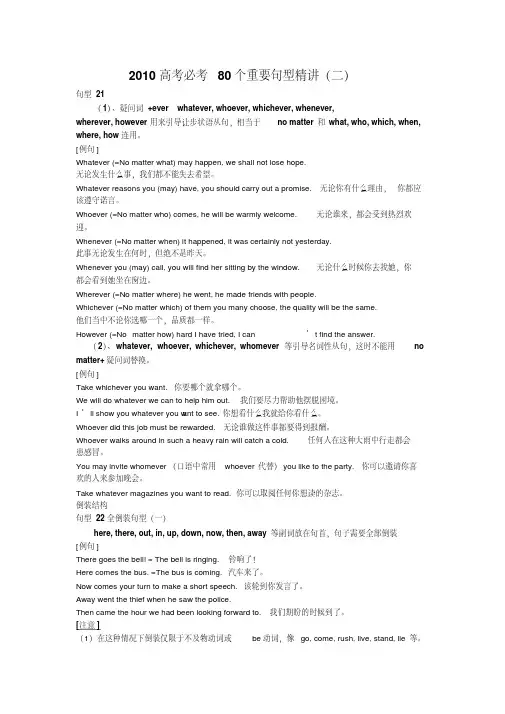
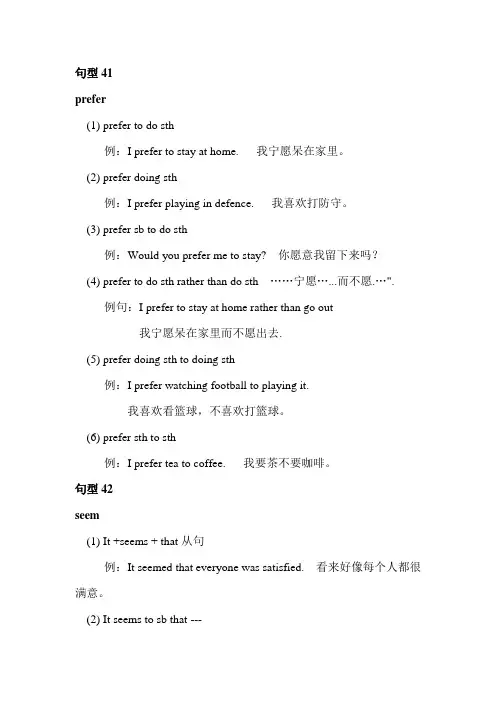
句型41prefer(1) prefer to do sth例:I prefer to stay at home. 我宁愿呆在家里。
(2) prefer doing sth例:I prefer playing in defence. 我喜欢打防守。
(3) prefer sb to do sth例:Would you prefer me to stay? 你愿意我留下来吗?(4) prefer to do sth rather than do sth ……宁愿…...而不愿.…".例句:I prefer to stay at home rather than go out我宁愿呆在家里而不愿出去.(5) prefer doing sth to doing sth例:I prefer watching football to playing it.我喜欢看篮球,不喜欢打篮球。
(6) prefer sth to sth例:I prefer tea to coffee. 我要茶不要咖啡。
句型42seem(1) It +seems + that从句例:It seemed that everyone was satisfied. 看来好像每个人都很满意。
(2) It seems to sb that ---例:It seems to me that she is right. 我看她是对的,(3) There seems to be ----例:There seems to be a heavy rain. 看上去要有一场大雨。
(4) It seems as if ----例:It seemed that she couldn't come to class.看样子她不能来上课了。
句型43表示“相差……;增加了……;增加到……”句型:(1) She is taller than I by three inches. 她比我高三英寸(2) There is one year between us. 我们之间相差一岁。
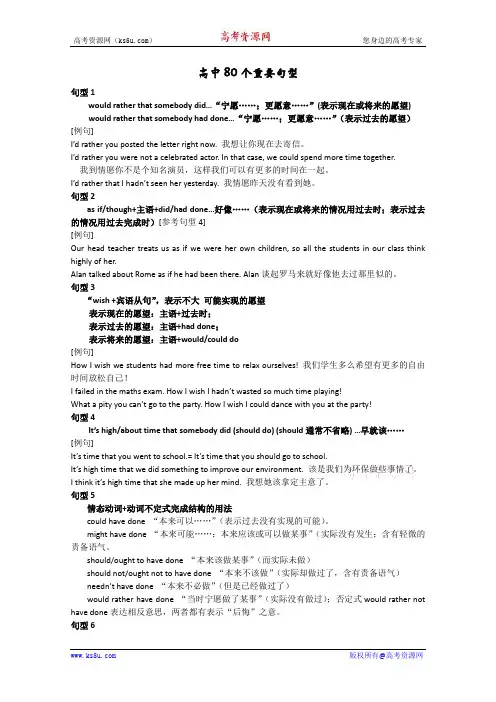
高中80个重要句型句型1would rather that somebody did…“宁愿……;更愿意……”(表示现在或将来的愿望) would rather that somebody had done…“宁愿……;更愿意……”(表示过去的愿望)[例句]I’d rather you posted the letter right now. 我想让你现在去寄信。
I’d rather you were not a celebrated actor. In that case, we could spend more time together.我到情愿你不是个知名演员,这样我们可以有更多的时间在一起。
I’d rather that I hadn’t seen her yesterday. 我情愿昨天没有看到她。
句型2as if/though+主语+did/had done…好像……(表示现在或将来的情况用过去时;表示过去的情况用过去完成时)[参考句型4][例句]Our head teacher treats us as if we were her own children, so all the students in our class think highly of her.Alan talked about Rome as if he had been there. Alan谈起罗马来就好像他去过那里似的。
句型3“wish +宾语从句”,表示不大可能实现的愿望表示现在的愿望:主语+过去时;表示过去的愿望:主语+had done;表示将来的愿望:主语+would/could do[例句]How I wish we students had more free time to relax ourselves! 我们学生多么希望有更多的自由时间放松自己!I failed in the maths exam. How I wish I hadn’t wasted so much time playing!What a pity you can’t go to the party. How I wish I could dance with you at the party!句型4It’s high/about time that somebody did (should do) (should通常不省略) …早就该……[例句]It’s time that you went to school.= It’s time that you should go to school.It’s high time that we did something to improve our environment. 该是我们为环保做些事情了。
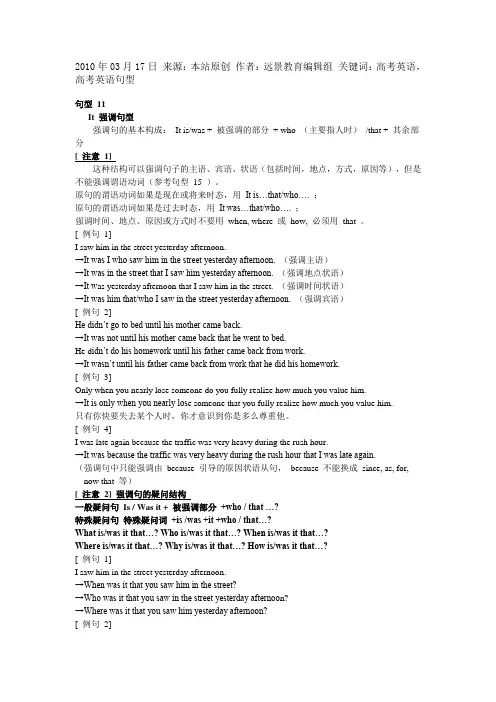
2010年03月17日来源:本站原创作者:远景教育编辑组关键词:高考英语,高考英语句型句型11It强调句型强调句的基本构成:It is/was + 被强调的部分+ who(主要指人时)/that + 其余部分[注意1]这种结构可以强调句子的主语、宾语、状语(包括时间,地点,方式,原因等),但是不能强调谓语动词(参考句型15)。
原句的谓语动词如果是现在或将来时态,用It is…that/who….;原句的谓语动词如果是过去时态,用It was…that/who….;强调时间、地点、原因或方式时不要用when, where或how, 必须用that。
[例句1]I saw him in the street yesterday afternoon.→It was I who saw him in the street yesterday afternoon.(强调主语)→It was in the street that I saw him yesterday afternoon.(强调地点状语)→It w as yesterday afternoon that I saw him in the street.(强调时间状语)→It was him that/who I saw in the street yesterday afternoon.(强调宾语)[例句2]He didn’t go to bed until his mother came back.→It was not until his mother came back that he went to bed.He d idn’t do his homework until his father came back from work.→It wasn’t until his father came back from work that he did his homework.[例句3]Only when you nearly lose someone do you fully realize how much you value him.→It is only when you nearly los e someone that you fully realize how much you value him.只有你快要失去某个人时,你才意识到你是多么尊重他。
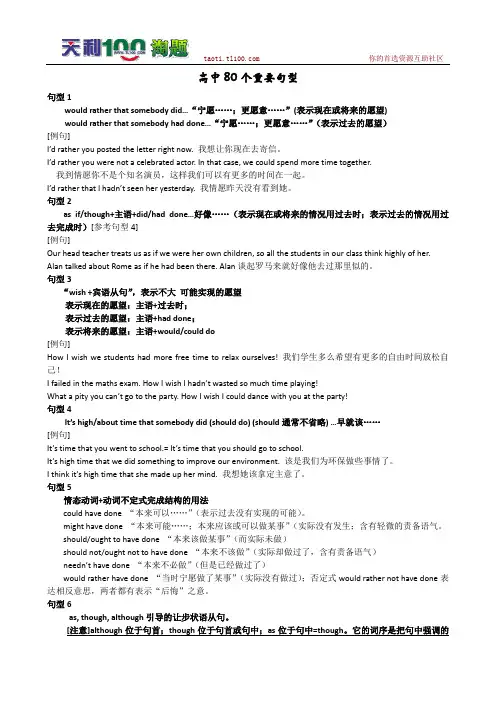
高中80个重要句型句型1would rather that somebody did…“宁愿……;更愿意……”(表示现在或将来的愿望)would rather that somebody had done…“宁愿……;更愿意……”(表示过去的愿望)[例句]I’d rather you posted the letter right now. 我想让你现在去寄信。
I’d rather you were not a celebrated actor. In that case, we could spend more time together.我到情愿你不是个知名演员,这样我们可以有更多的时间在一起。
I’d rather that I hadn’t seen her yesterday. 我情愿昨天没有看到她。
句型2as if/though+主语+did/had done…好像……(表示现在或将来的情况用过去时;表示过去的情况用过去完成时)[参考句型4][例句]Our head teacher treats us as if we were her own children, so all the students in our class think highly of her. Alan talked about Rome as if he had been there. Alan谈起罗马来就好像他去过那里似的。
句型3“wish +宾语从句”,表示不大可能实现的愿望表示现在的愿望:主语+过去时;表示过去的愿望:主语+had done;表示将来的愿望:主语+would/could do[例句]How I wish we students had more free time to relax ourselves! 我们学生多么希望有更多的自由时间放松自己!I failed in the maths exam. How I wish I hadn’t wasted so much time playing!What a pity you can’t go to the party. How I wish I could dance with you at the party!句型4It’s high/about time that somebody did (should do) (should通常不省略) …早就该……[例句]It’s time that you went to school.= It’s time that you should go to school.It’s high time that we did something to improve our environment. 该是我们为环保做些事情了。
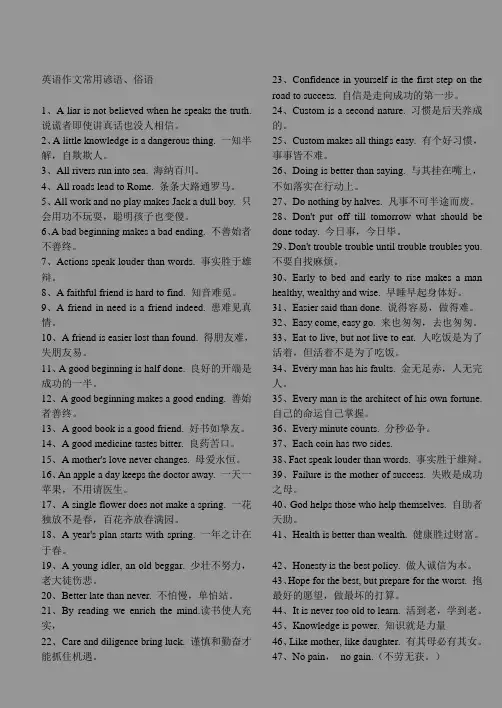
英语作文常用谚语、俗语1、A liar is not believed when he speaks the truth. 说谎者即使讲真话也没人相信。
2、A little knowledge is a dangerous thing. 一知半解,自欺欺人。
3、All rivers run into sea. 海纳百川。
4、All roads lead to Rome. 条条大路通罗马。
5、All work and no play makes Jack a dull boy. 只会用功不玩耍,聪明孩子也变傻。
6、A bad beginning makes a bad ending. 不善始者不善终。
7、Actions speak louder than words. 事实胜于雄辩。
8、A faithful friend is hard to find. 知音难觅。
9、A friend in need is a friend indeed. 患难见真情。
10、A friend is easier lost than found. 得朋友难,失朋友易。
11、A good beginning is half done. 良好的开端是成功的一半。
12、A good beginning makes a good ending. 善始者善终。
13、A good book is a good friend. 好书如挚友。
14、A good medicine tastes bitter. 良药苦口。
15、A mother's love never changes. 母爱永恒。
16、An apple a day keeps the doctor away. 一天一苹果,不用请医生。
17、A single flower does not make a spring. 一花独放不是春,百花齐放春满园。
18、A year's plan starts with spring. 一年之计在于春。
高中80个重要句型句型1would rather that somebody did…“宁愿……;更愿意……”(表示现在或将来的愿望) would rather that somebody had done…“宁愿……;更愿意……”(表示过去的愿望)[例句]I’d rather you posted the letter right now. 我想让你现在去寄信。
I’d rather you were not a celebrated actor. In that case, we could spend more time together.我到情愿你不是个知名演员,这样我们可以有更多的时间在一起。
I’d rather that I hadn’t seen her yesterday. 我情愿昨天没有看到她。
句型2as if/though+主语+did/had done…好像……(表示现在或将来的情况用过去时;表示过去的情况用过去完成时)[参考句型4][例句]Our head teacher treats us as if we were her own children, so all the students in our class think highly of her.Alan talked about Rome as if he had been there. Alan谈起罗马来就好像他去过那里似的。
句型3“wish +宾语从句”,表示不大可能实现的愿望表示现在的愿望:主语+过去时;表示过去的愿望:主语+had done;表示将来的愿望:主语+would/could do[例句]How I wish we students had more free time to relax ourselves! 我们学生多么希望有更多的自由时间放松自己!I failed in the maths exam. How I wish I hadn’t wasted so much time playing!What a pity you can’t go to the party. How I wish I could dance with you at the party!句型4It’s high/about time that somebody did (should do) (should通常不省略) …早就该……[例句]It’s time that you went to school.= It’s time that you should go to school.It’s high time that we did something to improve our environment. 该是我们为环保做些事情了。
1高考英语常用重点句型归纳1、 as 句型:(1 as引导方式状语从句句型:“按照……;正如……” 例:We do farm work as the old peasant teaches us.(2 as +形容词/副词原级+(a /an +名词+as ; 否定式:not as/so 。
as例:He is as good a player as his sister. (3 the same +名词+as 和……一样的…… (接名词或定语从句例:He is not the same man as he used to be. (4 as 引导非限制性定语从句例:As is known to us, knowledge is power. (5引导时间状语从句。
与 while 意义相近例:We get wiser as we get older. (6 引导原因状语从句,与 because 的用法相近 As it was getting very late, we soon turned back. (7 引导让步状语从句例:Child as he is, he knows much about science. 2、 prefer 句型:(1 prefer doing/to do sth/ sb to do sth 例:I prefer staying/to stay at home.Would you prefer me to stay?(2 prefer to do sth rather than do sth …… 宁愿…...而不愿…".例:I prefer to stay at home rather than go out . (3 prefer doing sth to doing sth例:I prefer watching football to playing it.3、 when 句型:(1 be doing sth when例:He was still smiling when the door opened and his wife came in. (2 be about to do sth when 例:We were about to start when it began to rain. (3 hardly … when…例:Hardly had I got home when it bagan to rain. 4、 seem 句型 :(1 It +seems(to sb + that从句例:It seemed that everyone was satisfied. 例:It seems to me that she is right. (2 There seems to be ----例:There seems to be a heavy rain. (3 It seems as if ----例:It seemed that she couldn't come to class . (4 sb seems(edto do/to be doing/have done sth.5、 what 引导的名词性从句(1 what 引导主语从句例:What surprised me is that everybody seemed to be very indifferent to her. (2 what 引导宾语从句例:We can learn what we do not know. (3 what 引导表语从句例:That is what I want. 6、 too 句型:(1 too. . . to do sth.太。
高中英语 80个重要句型句型 1would rather that somebody did“宁愿;更愿意” ( 表示现在或将来的愿望)would rather that somebody had done“宁愿 ;更愿意” ( 表示过去的愿望)[ 例句 ]I ’d rather you posted the letter right now.我想让你现在去寄信。
I ’d rather you were not a celebrated actor. In thatcase, we could spend more time together.我到情愿你不是个知名演员,这样我们可以有更多的时间在一起。
I ’d rather that I hadn’t seen her yesterday.我情愿昨天没有看到她。
句型 2as if/though+主语+did/had done好像(表示现在或将来的情况用过去时; 表示过去的情况用过去完成时) [ 参考句型 4][ 例句 ]Our head teacher treats us as if we were her own children, so all the students in our class think highlyof her.Alan talked about Rome as if he had been there. Alan谈起罗马来就好像他去过那里似的。
“wish + 宾语从句”,表示不大可能实现的愿望表示现在的愿望:主语+过去时 ;表示过去的愿望:主语+had done;表示将来的愿望:主语+would/could do[ 例句 ]How I wish we students had more free time to relax ourselves! 我们学生多么希望有更多的自由时间放松自己!I failed in the maths exam. HowI wish I hadn’t wasted so much time playing!What a pity you can’t go to the party. How I wishI could dance with you at the party!句型 4It ’s high/about time that somebody did (shoulddo) (should通常不省略)早就该[ 例句 ]It ’s time that you went to school.= It’s time that you should go to school.It ’s high time that we did something to improve our environment.该是我们为环保做些事情了。
高中80个重要句型句型1would rather that somebody did…“宁愿……;更愿意……”(表示现在或将来的愿望)would rather that somebody had done…“宁愿……;更愿意……”(表示过去的愿望)I’d rather you posted the letter right now. 我想让你现在去寄信。
I’d rather you were not a celebrated actor. In that case, we coul d spend more time together.我到情愿你不是个知名演员,这样我们可以有更多的时间在一起。
I’d rather that I hadn’t seen her yesterday. 我情愿昨天没有看到她。
句型2as if/though+主语+did/had done…好像……(表示现在或将来的情况用过去时;表示过去的情况用过去完成时)[参考句型4]Our head teacher treats us as if we were her own children, so all the students in our class think highly of her.Alan talked about Rome as if he had been there. Alan谈起罗马来就好像他去过那里似的。
句型3“wish +宾语从句”,表示不大可能实现的愿望表示现在的愿望:主语+过去时;表示过去的愿望:主语+had done;表示将来的愿望:主语+would/could doHow I wish we students had more free time to relax ourselves! 我们学生多么希望有更多的自由时间放松自己!I failed in the maths exam. How I wish I hadn’t wasted so much time playing!What a pity you can’t go to the party. How I wish I could dance with you at the party!句型4It’s high/about time that somebo dy did (should do) (should通常不省略) …早就该……It’s time that you went to school.= It’s time that you should go to school.It’s high time that we did something to improve our environment. 该是我们为环保做些事情了。
记住这180个句子可以让你掌握高考80%单词和全部语法!这180个句型,不仅包含了近五年高考试卷中80%的单词,更是涉及了高中阶段几乎所有重点句型,将这些句型延伸去分析或复习语法也是非常好的材料!一举多得,有时候学习并没那么复杂!1. That is the reason why I’m not in favour of revising the plan.这就是我不赞成修正这个计划的原因。
2. His failure was due to the fact that he had not practised for a long time.他的失败是由于他没有练习很长时间。
3. It is likely that it will rain in the evening.可能晚上会下雨。
4. How they went to America is what I want to know.他们如何到的美国是我想知道的事情。
5. It occurred to him that he had left his key at home.他突然想起把钥匙落在了家里。
6. The reason why he came late was that he didn’t catch the early bus.他迟到的原因是他没有赶上早班车。
7. I’m looking forward to the day when Tai Wan returns to China.我期待着台湾回归祖国的那一天。
8. He sat by the fire, reading a novel.他坐在火旁,读着一本小说。
9. My dream came true at last.我的梦想最终实现了。
10. It will not be long before we meet again.不久之后我们就会再次见面的。
11. The English play in which my students acted at the New Year’s party was a great success.新年聚会上,学生表演的这部英语剧非常成功。
高考英语临沂固定句型知识点经典测试题及答案一、选择题1.I can’t thank you ____ much for the kindness, because without your help I couldn’t have succeeded in the exam.A.so B.too C.such D.that2.I ______ thank you too much for all your help to my son while we were away from home. A.won’t B.shouldn’t C.can’t D.needn’t3.It is only when people live on à very limited diet_________ it is necessary to make a special effort to supply the missing vitamins.A.so B.that C.since D.until4.This was the first time that she _________by the beauty of the West Lake.A.was fascinated B.had been fascinated C.has been fascinated D.fascinated5.It was the first time in my life that I________ the Great Wall. You can’t imagine how excited I felt!A.had visited B.visitedC.visit D.have visited6.It __________ whether or not this idea can be put into practice.A.remains to see B.remains to be seenC.is remained to see D.is remained to be seeing7.The more we can enjoy what we have, the _____ we are.A.happierB.happiestC.more happilyD.most happily8.Do you consider it any good______ your eyes to your cellphone every day?A.gluing B.to glue C.having glued D.to have glued9.I was on the point of speaking my wife stood up and stopped me.A.since B.as C.when D.while10.AIDS is said _______the biggest health challenge to both men and women in that area in the past three years.A.that it is.B.to be.C.that it has been.D.to have been.11.The efforts made by researchers ____ possible the appearance of a new life-saving medicine. A.were made B.madeC.made it D.were made it12.Mary, I should tell you it is the third time that you ________ your homework.A.forgot to do B.forgot doingC.have forgotten to do D.had forgotten doing13.______ a hole in one of the walls. Otherwise, we couldn’t have seen what was goin g on inside the room.A.There happened to be B.It happened to beC.There happened to have D.It happened to have14.Ten years ago the population of our village was_________ that of theirs.A.as twice large as B.twice as large asC.twice as much as D.as twice much as15.To solve the shortage of electricity,the government has taken some measures, but it will be some time________the situation returns to normal.A.since B.when C.before D.unless16._______ is the power of TV that it can make a person suddenly famous.A.It B.This C.That D.Such17.When it __________ advertisements, we must use our intelligence and not be a slave to them!A.sticks to B.comes toC.goes to D.occurs to18.A: How much does it cost to send a parcel from Shanghai to Canada?B: It is too expensive __________.A.to be thinking B.even to think itC.even to consider it D.to consider to do it19._____ we shall be able to help you when you’re in trouble. Please trust us.A.It’s doubtful whether B.We doubt whetherC.It’s no doubt that D.There’s n o doubt that20.________, I believe, and you can see he wasn’t lying.A.Casting a glance at the boy B.One glance at the boyC.Glance cast at the boy D.If you cast a glance at the boy21.I would appreciate ______ if you could give me a reply as soon as possible.A.you B.it C.that D.them22.I had hardly rung the bell ________ the door was opened suddenly, and my son rushed out to greet me.A.before B.untilC.as D.since23.I know nothing about the young lady _______ she is from Beijing.A.except B.that C.except that D.except for24.I've got lo make _______he told a lie.A.that clear B.it clear that C.quite clear D.this clear that 25.It will be many years ______ the doctors and medical scientists can find _____ for cancer. A.since; cures B.when; treatmentsC.before; cures D.until; treaments【参考答案】***试卷处理标记,请不要删除一、选择题1.B解析:B【解析】【详解】考查固定句型。
高中80个重要句型句型1would rather that somebody did…“宁愿……;更愿意……”(表示现在或将来的愿望)would rather that somebody had done…“宁愿……;更愿意……”(表示过去的愿望)[例句]I’d rather you posted the letter right now. 我想让你现在去寄信。
I’d rather you were not a celebrated actor. In that case, we could spend more time together.我到情愿你不是个知名演员,这样我们可以有更多的时间在一起。
I’d rather that I hadn’t seen her yesterday. 我情愿昨天没有看到她。
句型2as if/though+主语+did/had done…好像……(表示现在或将来的情况用过去时;表示过去的情况用过去完成时)[参考句型4][例句]Our head teacher treats us as if we were her own children, so all the students in our class think highly of her.Alan talked about Rome as if he had been there. Alan谈起罗马来就好像他去过那里似的。
句型3“wish +宾语从句”,表示不大可能实现的愿望表示现在的愿望:主语+过去时;表示过去的愿望:主语+had done;表示将来的愿望:主语+would/could do[例句]How I wish we students had more free time to relax ourselves! 我们学生多么希望有更多的自由时间放松自己!I failed in the maths exam. How I wish I hadn’t wasted so much time playing!What a pity you can’t go to the party. How I wish I could dance with you at the party!句型4It’s high/about time that somebody did (should do) (should通常不省略) …早就该……[例句]It’s time that you went to school.= It’s time that you should go to school.It’s high time that we did something to improve our environment. 该是我们为环保做些事情了。
I think it’s high time that she made up her mind. 我想她该拿定主意了。
句型5情态动词+动词不定式完成结构的用法could have done “本来可以……”(表示过去没有实现的可能)。
might have done “本来可能……;本来应该或可以做某事”(实际没有发生;含有轻微的责备语气。
should/ought to have done “本来该做某事”(而实际未做)should not/ought not to have done “本来不该做”(实际却做过了,含有责备语气)needn’t have done “本来不必做”(但是已经做过了)would rather have done “当时宁愿做了某事”(实际没有做过);否定式would rather not have done 表达相反意思,两者都有表示“后悔”之意。
句型6as, though, although引导的让步状语从句。
[注意]although位于句首;though位于句首或句中;as位于句中=though。
它的词序是把句中强调的形容词、副词、动词或名词放在连词前。
[参考倒装结构] 请注意下列句式的变化:[例句]1. Although/Though I’m young, I already know what career I want to follow.→Young as/though I am, I already know what career I want to follow.我虽然年轻,但我已经明白我应该追随什么样的事业。
2. Although/Though I respect him very much, I cannot agree with his idea.→Much as/though I respect him, I cannot agree with his idea. 虽然我很尊重他,但是我不同意他的观点。
3. Although/Though he is a child, he knows a lot of Chinese characters.→Child(省略冠词)as/though he is, he knows a lot of Chinese characters. 他虽然还是个孩子,却认识了许多汉字。
4. Although he tried, he couldn’t solve the probl em.→Try as he might, he couldn’t solve the problem. 尽管他努力了,但是他没有解决问题。
5. Although it is raining, I’m going out for a walk.→Raining as it is, I’m going out for a walk. 天虽然在下雨,我还是要出去散步。
6. Strange as it may seem, nobody was injured in the accident. 这次意外虽然显得不可思议,却没有人受伤。
7. Much as I would like to help, I have a lot to do. 虽然我很想帮助你,但是我有很多事要做。
8. Object as you may, I will go. 纵使你反对,我也要去。
句型7…before…特殊用法(1)“没来得及……就……”[例句]The roof fell before he had time to dash into the room to save his baby.他还没有来得及冲进房间救孩子,房顶就塌了。
He ran off before I could stop him. 我还没有来得及阻止,他已经跑了。
To my great disappointment, my favorite singer left the concert before I could have a word with her.让我非常失望的是,我还没有来得及和我最喜欢的歌手打招呼,她就已经离开了。
句型8…before…特殊用法(2)“过了多久才……”或“动作进行到什么程度才……”[例句]They walked about fifty miles to the west before they saw a village.他们西行50英里才看到一个村庄。
The workers worked day and night about three days before everything returned to normal.工人们连续工作3天才使一切恢复正常。
He almost knocked me down before he knew it.他几乎撞到我了才意识到。
We had walked a long way before we found some water.我们走了很长的路才找到一点水。
Five years went by before I knew it. 不知不觉,五年过去了。
句型9It was + 时间段+before….“过了多久才(怎么样)……”It was not long before….“不久,就……”It will (not) be +时间段+before….“要过多久(不久)……才……”(before从句谓语动词要用一般时态)[例句]It was not long before he sensed the danger of the position.不久他就意识到他处境的危险。
It was five days before he came back. 五天后他才回来。
It will be half a year before you graduate from the school. 再过半年你才能毕业。
It will not be long before they understand each other. 他们大概不久就会互相了解。
句型10in case of…(+n.) “以防;万一”;in case that…“以防,万一……”(谓语动词用一般现在时态或should+动词原形)[例句]In case of fire, what should we do?Please remind me about it in case I forget/should forget. 万一我忘了,请提醒我。
In case (that) John comes/should come, please tell him to wait.Please take your umbrella in case (that it rains/should rain).带上雨伞,以防下雨。
句型11It强调句型强调句的基本构成:It is/was + 被强调的部分+ who(主要指人时)/that + 其余部分[注意1]这种结构可以强调句子的主语、宾语、状语(包括时间,地点,方式,原因等),但是不能强调谓语动词(参考句型15)。
原句的谓语动词如果是现在或将来时态,用It is…that/who….;原句的谓语动词如果是过去时态,用It was…that/who….;强调时间、地点、原因或方式时不要用when, where或how, 必须用that。
[例句1]I saw him in the street yesterday afternoon.→It was I who saw him in the street yesterday afternoon.(强调主语)→It was in the street that I saw him yesterday afternoon.(强调地点状语)→It wa s yesterday afternoon that I saw him in the street.(强调时间状语)→It was him that/who I saw in the street yesterday afternoon.(强调宾语)[例句2]He didn’t go to bed until his mother came back.→It was not until his mother came back that he went to bed.He didn’t d o his homework until his father came back from work.→It wasn’t until his father came back from work that he did his homework.[例句3]Only when you nearly lose someone do you fully realize how much you value him.→It is only when you nearly lose someone that you fully realize how much you value him.只有你快要失去某个人时,你才意识到你是多么尊重他。